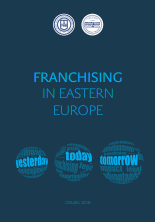COMPLEX NATURE OF FRANCHISING AND NEW CHALLENGES FOR DEVELOPMENT
COMPLEX NATURE OF FRANCHISING AND NEW CHALLENGES FOR DEVELOPMENT
Author(s): Ljiljana Kukec
Subject(s): Economy, Geography, Regional studies, Business Economy / Management, Evaluation research, Marketing / Advertising
Published by: Sveučilište Josipa Jurja Strossmayera u Osijeku, Ekonomski fakultet u Osijeku
Keywords: Eastern Europe; economy; franchising; marketing; business model; challenges; development;
Summary/Abstract: Franchising, in the economic sense, is a method of marketing expansion used on behalf of successful companies to expand their products or services through a network of retail units owned by independent entrepreneurs, sharing with them the brand, knowhow and marketing techniques in exchange for entrance fee and royalties by each of the retail units (Matthews, De Bolt and Percival, 2006: 6). Regardless of whether franchising is defined through its legal, economic or some other form, it is characterized by the fact that it is an entrepreneurial alliance of two independent entrepreneurs who aim to exploit a recognized opportunity to create growth through this alliance, so as to increase the chances of success (Timmons and Spinelli, 2003). Because franchising is a replication of success, it has been the subject of many of research studies, and some of them show that, regardless of economic interests or the legal form of franchising, the relationship between the two main parties is what contributes the most to success, and this relationship is much more than a legal or economic/business relationship. It is a personal relationship in the first place, and only when the personal relationship descends to the level of business relationship, that relationship is damaged. A further degradation of successful relationship from a business relationship to a legal one occurs when the business relationship is already heavily damaged because, despite the popular belief, the real, quality franchise relationship is not defined by the franchise agreement, but by common goals, mutual trust, respect and open communication (Matthews, De Bolt and Percival, 2006). Franchise on its own is not an instant success, what enables it, besides the above mentioned personal relationship, is know-how, innovation, quality product/service and standard procedures that stand in the centre of every franchise package.
Book: Franchising in Eastern Europe - Yesterday, Today, Tomorrow
- Page Range: 21-32
- Page Count: 12
- Publication Year: 2018
- Language: English
- Content File-PDF

